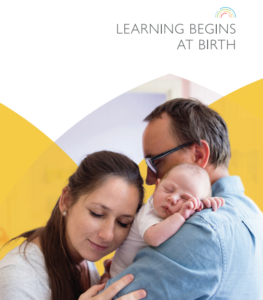 Learning Begins at Birth, an updated guide for new and expectant parents is being distributed statewide through Nebraska birthing hospitals, WIC and public health centers, nonprofits, home-visiting initiatives and other organizations. It’s available in English, Spanish, Arabic, Vietnamese and Karen.
Learning Begins at Birth, an updated guide for new and expectant parents is being distributed statewide through Nebraska birthing hospitals, WIC and public health centers, nonprofits, home-visiting initiatives and other organizations. It’s available in English, Spanish, Arabic, Vietnamese and Karen.
Planning for and guiding the early development of young children can be hard—even overwhelming—for many parents. This is particularly true for families with limited resources or for parents taking on this important role for the first time. The purpose of the guide is to make it easier for parents to understand children’s developmental needs and navigate through the sometimes daunting array of services and supports available to them.
Learning Begins at Birth was produced as part of Nebraska’s federal Preschool Development Grant by a multi-organizational workgroup representing Nebraska Extension, the Nebraska Young Child Institute, Nebraska departments of Education and Health and Human Services, Nebraska Children and Families Foundation, First Five Nebraska and other partners.
Up-to-date, easy-to-use resource
“Our goal was to produce an up-to-date, accurate and easy-to-use resource to address the needs of diverse families,” said Amy Napoli, assistant professor and early childhood extension specialist at the University of Nebraska–Lincoln. Napoli leads the team responsible for redeveloping and updating the booklet’s content. “It’s intended to provide practical and important information for parents every step of the way—from the prenatal months through age 5. It covers maternal well-being, monitoring children’s health and nutrition, safety, parent-child interactions, choosing quality child care—even self-care for parents.”
The resource also includes information on how to access programs and services that support new parents. “Raising a young child takes a huge amount of focused attention and effort in the most ideal circumstances,” said Napoli. “That becomes even harder if your child has special developmental needs or your family faces other challenges. Trying to wade through information on developmental screenings or nutrition assistance programs can put a lot of pressure on any parent—even those with strong networks of support. We want Learning Begins at Birth to offset some of those pressures for Nebraska families.”
Parents play a crucial role
Adam Feser, policy advisor at First Five Nebraska, said Learning Begins at Birth reflects research showing that informed parenting plays a crucial role in children’s developmental outcomes. But there are broader implications to consider as well. “Well-prepared, informed parenting also helps build stronger, nurturing families and cohesive communities,” said Feser, who co-leads the project workgroup. “State statute requires that every parent of a child born in Nebraska receives this information, so this is about the long-term success of our state and its citizens.”
Although Learning Begins at Birth has been available since 2003 as a downloadable document, the current project marks the first coordinated effort to disseminate a fully revised version to the families it was intended for.
“Nebraska’s Preschool Development Grant presented an opportunity to create a new and better resource and put a physical copy into parents’ hands at no cost to them or the agencies helping us distribute it,” said Feser.
If you work with an organization that serves new and expectant parents and are willing to help distribute Learning Begins at Birth, please email Adam Feser with the number of copies and the language(s) you’d like and a mailing address.
Access Learning Begins at Birth



